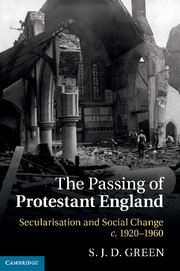Conclusion: the passing of protestant England
Published online by Cambridge University Press: 10 January 2011
Summary
‘The life of nations, no less than that of men, is lived largely in the imagination.’ This is, perhaps, particularly true of its religious life. It was definitely the case for the life of protestant England, c. 1920–1960. The characteristic faith of this land during those years will never be captured solely in the solid things that can be subsequently counted. It was sustained as much through those elusive images in the mind's eye of committed Christians as in the concrete facts of common cultural life. Protestant England was never something that once just happened. Nor was it merely, as fashionable explanation now has it, a historical construct. It was also – and always – a living aspiration. In some parts of the land, it still is. No small part of the passing of protestant England should be sought in the exhaustion of that hope; alternatively, in the evaporation of an illusion.
The precise origins of neither will ever be dated with any real degree of precision. Nor, indeed, can the emergence of protestant England itself. This has been traced to the eruption of Lollardy in the later medieval kingdom. Other accounts date it back no further than the popular impact of nineteenth-century urban evangelisation. Contemporaries and chronicles alike have pointed to the significance of 1534 (separation from Rome), 1559 (the Elizabethan settlement), perhaps 1642 (the British civil wars) or even to the so-called ‘long eighteenth century’ more generally.
- Type
- Chapter
- Information
- The Passing of Protestant EnglandSecularisation and Social Change, c.1920–1960, pp. 303 - 316Publisher: Cambridge University PressPrint publication year: 2010



